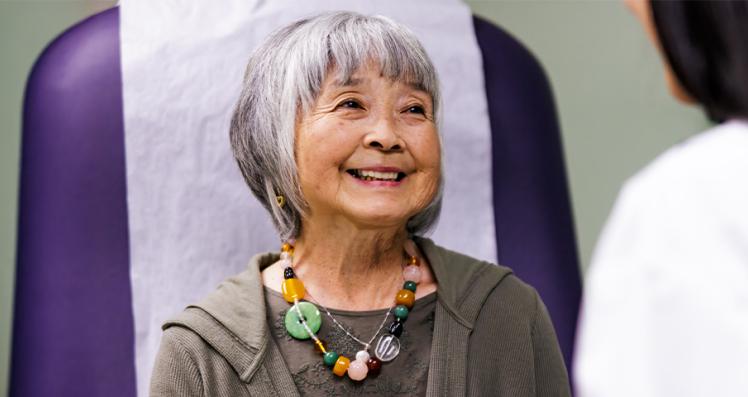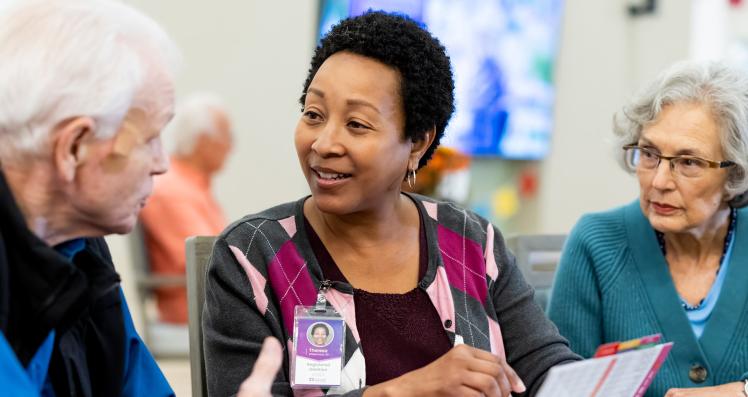
Vaccinations protect us all from a wide range of serious and sometimes deadly diseases. For seniors, they’re especially important. That’s because as we age, our immune systems naturally get weaker. Learn why you or an elder in your life may need to talk with their doctor and get up to date with their shots.
Immunizations Matter
Staying up to date on your immunizations is essential for:
- Preventing Disease: Immunizations help prevent the spread of contagious diseases like measles, mumps, and whooping cough, flu, pneumonia, Covid-19 as well as painful diseases such as shingles. These diseases can have severe health consequences, particularly for children and the elderly.
- Community Immunity: When most people in a community are vaccinated, it creates a protective barrier that makes it harder for diseases to spread.
- Avoiding Complications: Vaccinations can prevent complications associated with diseases, such as pneumonia, meningitis, and other serious conditions. For seniors, immunizations can reduce the risk of severe illness, hospitalization and death.
Know Your Vaccines
With so many vaccinations to keep track of, it helps to understand what they are and the purposes they serve:
- Influenza (Flu): When it comes to the flu, seniors are considered a high-risk group. Every year, tens of thousands of older adults are hospitalized due to flu-related complications. Additionally, the majority of deaths due to influenza occur among older populations. A yearly high-dose or adjuvanted flu vaccine provides a strong defense for the immune system.
- COVID-19: In the wake of the pandemic, COVID-19 remains a significant health risk for seniors. Older adults are at the highest risk of any group for severe illness, hospitalization, and death from the coronavirus. COVID-19 vaccines have been proven to reduce the risk of severe symptoms.
- RSV: Respiratory syncytial virus (RSV) is a common respiratory disease that affects the throat, nose, and lungs, and can lead to complications such as bronchitis and pneumonia. Health experts encourage vaccination for all adults aged 75 and older and for adults aged 60-74 who are at increased risk of severe RSV.
- Pneumococcal Disease: Pneumococcal disease is any bacterial infection caused by streptococcus pneumoniae and comprises illnesses such as pneumonia, meningitis, and bloodstream infections. Multiple shots may be required for strong protection against pneumococcal disease depending on a person’s vaccine history.
- Shingles Vaccine (Shingrix): Shingles is a painful rash caused by the reactivation of the chickenpox virus more commonly spread among older adults. The Shingrix vaccine is over 90% effective at preventing shingles.
- Tdap or Td: Tetanus, diphtheria, and pertussis (whooping cough) can cause serious illness in older adults. For seniors who have yet to be vaccinated against these diseases, a Tdap vaccine followed by a Td (tetanus and diphtheria) booster every 10 years is recommended. Tdap vaccination is particularly crucial for older adults who are around young children and newborns, as these groups are at high risk of pertussis.
Seniors and Vaccinations: It takes a Village
Helping elders in your life stay up-to-date with recommended vaccinations is a meaningful way to support their health. Taking the time to talk with them about their vaccination needs, assist with making appointments, and offer transportation if needed. Your support can make a big difference in keeping them safe and healthy.
Chief-Medical Officer for Center for Elders’ Independence (CEI) Dr. Jim Mittelberger, says, “We are proud to have achieved real success in immunizing our participants. Through our targeted programs and education, CEI has maintained high immunization rates. We are dedicated to ensuring that our community is well-protected against preventable diseases. Our staff and participants recognize the importance of vaccinations and the positive impact it can have on public health.”
CEI’s Current Immunization Stats:
- 91% participants received at least 1 pneumococcal vaccination
- 83% participants vaccinated against the Influenza
- 92% of current CEI participants are fully vaccinated against COVID-19
- 82% participants vaccinated with at least 1 dose of the 2-dose Shingles series
In CEI’s PACE model, we have a whole team of caregivers from providers and nurses to social workers, home care aides, and drivers. It takes everyone working together with elders and their families to make these rates of vaccination possible.
Even if you are not part of a PACE plan you can organize ways to help you keep up to date on immunizations. Many health plans offer patient reminders through their patient portal websites. Or you can make note on your calendar about when your next vaccination is due. Talk with your doctor to find out other ways they can help you manage your immunizations.
Remember, by staying up to date on your immunizations, you protect yourself, your loved ones, and your community.

